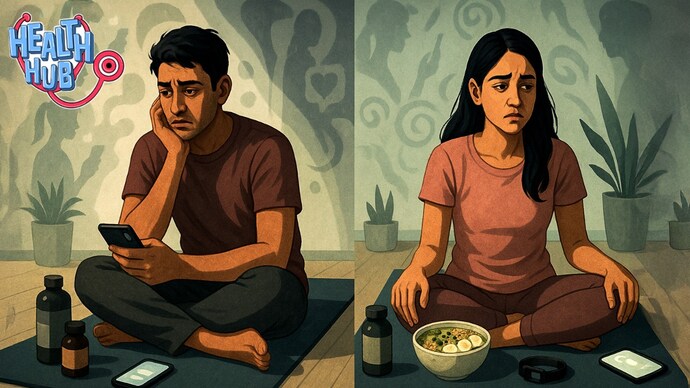Are you trapped in ‘Wellness Trap’? When self-care backfire on mental health
Green smoothies to gratitude promises to healing the self-care boom of India. But is this also triggering anxiety and burnout quietly? Doctors say that the health is at the end of this burden of being “well”

In short
- Self-care is not restricted to having a health suggestion, it has become standard
- Patients now report anxiety related to health and productivity habits
- 26% increase in symptoms like orthorexia among women going to college in Tier -1 cities
Later this week, 33 -year -old Ritika Sharma found herself crying in the kitchen. Not because something was terrible, but because he did not tick his wide self-care checklist: No Smuthies, No 10K Steps, No Yoga Sessions, No Jernling. Just fatigue. And immense crime.
“I have built this routine around wellness,” she explains. But there are days when it cannot keep. “It seems that I have failed my body and mind. And this failure seems heavy on the mind.”
Today, self-care is no longer restricted to have health suggestions. Unfortunately, it has become a standard. Indian cities, young professionals, students and adolescents are busy with daily rituals (what they say), including cold-represented juices, harsh exercises, gym sessions, skincare governance and many apps for mindyfulness.
However, if you scratch that surface, a cool contradiction is slowly taking shape.
At some points, practices were to nourish which are now performing. In most cases, they are psychologically harmful.
Self-aviation on care
Here, social media is to play the role. Scroll via Instagram or YouTube, and you will not find any shortage of “Miracle Morning,” Detox, Digital Fast and 30-Day Glow-Up Challenges.
“The problem is that these routines are often shared without reference,” a Mumbai -based clinical psychologist Dr. Mithi Iyer says, who work with working professionals and college students. “These posts are aspiring, yes, but extremely curate.
The feeling of low fall is not just disappointing, it can also be dangerous.
Dr. According to Iyer, more Indian patients now report anxiety related to health and productivity habits that were initially to relieve stress. She explains the incident: “We have started resting like something to relax. Even the nap comes with guilt. It is not self-care, it is self-monitoring.”
Diet and discipline spiral
The rise of the wellness industry in India has also changed the way people eat. One frequent local staples such as ghee, millet, or fermented rice are being replaced by almond flour, protein powder and fancy superfoods.
Delhi -based clinical nutritionist and food disorder specialist Dr. Ritika Khera says, “This is an innings that is not only vested in the cultural context, but a psychological bearings.” “Youth are not only trying to eat healthy, they are trying hard to control their lives through their food consumed. The problem is that when control is slipped, it can cause nervousness.”
Dr. Khera highlighted the increasing incidence of orthorexia – an unhealthy passion with “clean” food. “Orthorexia can be difficult to diagnose because it hides behind the mask of health consciousness. But mentally, it can be as disturbed as it will be caused by any food disorder.”
In a period of two years, a 26% increase in symptoms like orthorexia among women going to college in Tier -1 cities was quoted in a recent study published by the Indian Journal of Health Psychology in 2023.
“They think they are getting disciplined,” Dr. Khera says. “But what they are really punishing themselves to be human.”
Is wellness a penis pressure?
Especially for Indian women, welfare often comes with added accessories. It is not just about staying healthy, it is about good looking, looking balanced and combating without complaint.
Swati R, a 29 -year -old tech employee from Hyderabad, says, “You are expected to shine through your period, meditate through burnout and bounce from delivery within six weeks.” “I loved yoga, but the moment I started filming it for Instagram, it stopped being mine.”
Words such as #hotgirlwalks and #Glowupchallenge can be empowered, but they often strengthen the very stereotypes that they claim to challenge. They set bar for “good health” so that it is so much that is so narrow that most people are always feeling insufficient.
Celebs called the trend out
India’s largest stars are not immune for the weight of wellness culture. Take superstar Deepika Padukone. Despite his discipline, the actor has talked about struggling with depression and how she looks and how she felt. Sameera Reddy, who was once immersed under the pressure of pregnancy image, chose the ideal of perfection for a ditch and embraced her which she calls her “messy maternal uncle”.
Virat Kohli, who is known for her athletic rule, also admitted that her strict clean eating habits were mentally tired over time. The actor was then Siddharth who probably offered the most honest criticism: “Yoga and Kail juice are not mental health care. There is a salary. Clean air.”
These stories indicate an important truth: health is not the one who looks from outside.
What is real welfare?
Experts say that real welfare is very low to do everything with perfection and appearance. Dr. Iyer says, “Walking without your phone, a laugh with friends, a nap without a crime. These are things that actually restore us,” Dr. Iyer says
Dr. Khera and Dr. Iyer advocates for the return of simple, more sustainable welfare in both Indian traditions that prefer balance, community and joy, not pressure.


